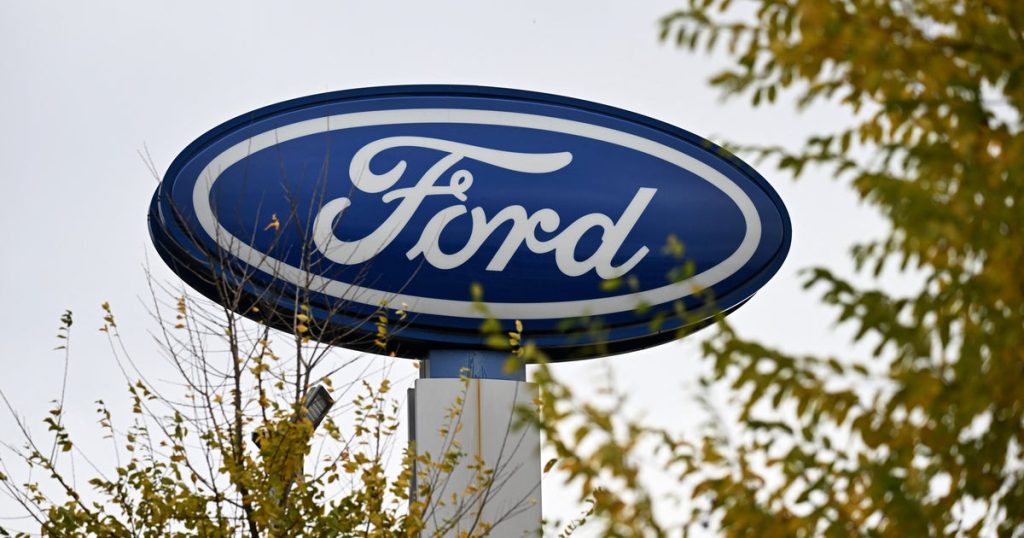Ford Motor Company is recalling over 197,000 Mustang Mach-E vehicles due to malfunctioning door latches that risk trapping passengers inside. Announced by the National Highway Traffic Safety Administration (NHTSA), the recall impacts models from 2021 to 2025 and includes an additional 120,000 vehicles in international markets. Although no injuries or accidents have been reported, the company is implementing a software update to resolve the issue as safety remains a top priority.
| Article Subheadings |
|---|
| 1) Overview of the Recall Issue |
| 2) Implications for Affected Models |
| 3) Safety Concerns Highlighted by the NHTSA |
| 4) Ford’s Response and Remedial Actions |
| 5) Future Implications for Electric Vehicles |
Overview of the Recall Issue
The latest recall by Ford affects 197,432 Mustang Mach-E vehicles, which are part of the company’s electric vehicle lineup. This safety measure was prompted by the NHTSA’s findings regarding faulty door latches that can malfunction, leaving the doors locked even after a passenger exits the vehicle. This effectively traps individuals inside, particularly children who may not be able to unlock the doors from the inside.
This announcement comes in a broader context as vehicle manufacturers continually strive to meet safety standards while also innovating their electric vehicle offerings. The recall encompasses models produced between 2021 and 2025, which have quickly gained popularity in the market.
Implications for Affected Models
In addition to the recall in the United States, Ford is also recalling around 120,000 vehicles globally, further demonstrating the widespread impact of this issue. The Mustang Mach-E, being a flagship electric model for Ford, is critical for the company as it seeks to cultivate its image in the electric vehicle market. Problematic latches not only pose a risk to passengers but could also dent consumer confidence in an already competitive segment.
The recall highlights the importance of rigorous quality checks and reliable technology in electric vehicles. As Ford attempts to expand its footprint in the EV market, this incident could potentially create hesitance among consumers looking to transition from traditional gasoline vehicles.
Safety Concerns Highlighted by the NHTSA
The NHTSA’s involvement in publicizing the recall underlines the agency’s role in ensuring vehicle safety across the nation. They indicated that the issue primarily arises when the battery level of the car drops dangerously low. In such instances, the door latches may unintentionally remain locked, creating a dire scenario for individuals trying to exit the vehicle.
According to the NHTSA, such a malfunction could be especially dangerous in extreme temperatures, where trapped individuals could face heat-related health issues. The agency has underscored the need for immediate action to prevent any potential incidents arising from the faulty latches. The gravity of such public health concerns adds a pressing dimension to Ford’s rectification efforts.
Ford’s Response and Remedial Actions
In response to the recall, officials from Ford announced that the company will be issuing a software update aimed at rectifying the problems with the door latches. A spokesperson for the company mentioned that they are currently unaware of any accidents or injuries resulting from this particular issue. Given the seriousness of the safety risks involved, Ford is moving swiftly to alert affected vehicle owners regarding the recall.
Expectations are that letters will be dispatched to owners starting June 23, informing them about the safety risk associated with their vehicles. Additionally, Ford encourages owners to reach out to customer service or the NHTSA for further guidance and support. Proper notification procedures are vital for ensuring that customers remain informed and can take necessary action.
Future Implications for Electric Vehicles
This incident is a reminder of the challenges ahead as the automotive industry shifts toward electric vehicles. With growing demand for EVs, manufacturers like Ford must not only focus on advancements in battery life and vehicle range but also on comprehensive safety measures. This recall could serve as a cautionary tale, prompting other manufacturers to closely examine their safety protocols, particularly concerning electric models.
Securing consumer trust and ensuring the safety of new technologies is paramount. As electric vehicle adoption increases, manufacturers will face the dual challenge of innovating while rigorously maintaining quality assurance. This episode could incite discussions around regulatory measures and best practices for electric vehicle safety nationally.
| No. | Key Points |
|---|---|
| 1 | Ford recalls over 197,000 Mustang Mach-E vehicles due to faulty door latches. |
| 2 | The recall includes 120,000 vehicles in global markets. |
| 3 | NHTSA warns that faults can trap passengers, particularly children. |
| 4 | Ford will issue a software update to resolve the issue. |
| 5 | The incident raises broader concerns about electric vehicle safety. |
Summary
The recall of over 197,000 Ford Mustang Mach-E vehicles underscores the significant safety challenges electric vehicle manufacturers face as they innovate new technologies. As noted by the NHTSA, the malfunctions related to door latches could pose serious risks to passenger safety, particularly in emergency situations. Ford’s prompt action demonstrates a commitment to resolving the issue, but the broader implications for consumer trust and regulatory scrutiny in the EV market remain a topic for discussion as the sector continues to evolve.
Frequently Asked Questions
Question: What are the main concerns regarding the Mustang Mach-E recall?
The primary concern revolves around malfunctioning door latches that can trap passengers inside, especially children, if the battery level drops too low.
Question: How is Ford addressing the issue with the recalled vehicles?
Ford is issuing a software update designed to fix the faulty door latch problem, along with notifying affected owners through letters.
Question: What should Mustang Mach-E owners do if they receive a recall notice?
Owners are encouraged to contact Ford’s customer service or the NHTSA for further information and assistance regarding the recall.


